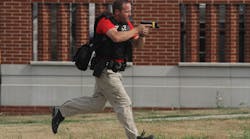Posted in the summer of 2009 on Officer.com, in her article "Street Smart vs. Book Smart," Michelle Perin writes that in 1973, the National Advisory Commission on Criminal Justice Standards and Goals requested a national minimum education level of at least a four-year college degree.
"While the number of officers that have degrees today is not firmly known," says Louis Mayo, executive director of the Police Association for College Education (PACE), "it is estimated between 25 and 30 percent of police officers today have a Bachelor of Arts degree or higher."
A common situation for many working officers is a difficulty to attend class with an unstable schedule, leaving the online option. Questions can quickly outnumber the answers — leaving a blank cursor blinking on your favorite search engine.
"I guess you really need to start by understanding there is a difference between training and education," explains Kim Clay, dean of the College of Safety and Emergency Services at Columbia Southern University (CSU). He sees training as more of a hands-on learning experience while education leans more toward the theory-based elements.
Recognition for your work
Understanding the working law enforcement officer has gone through a number of hours of training, universities do make the appropriate accommodations. A number of credit hours for a degree can be credited pending approval of the university. CSU, for example, allows an officer or deputy to "bring in" 21 hours of college credit toward a bachelor's program and 12 towards an associate degree. Similarly, Liberty University Online (LUO), a Christian-based institution, offers its officers credit taking life experiences into account.
"We do what we can to maximize their transfer credit," says Wendy Morales, director of Online Marking for LUO. "This essentially minimizes the amount of tuition they are going to have to pay and helps someone graduate that much faster."
She explains that a student who has gone through basic law enforcement training can receive up to 14 credits automatically, while any federal law enforcement training can earn additional credits. Morales adds that additional credits are awarded to U.S. Border Patrol agents.
Constance St. Germain-Driscoll, director of the Criminal Justice and Legal Studies of the American Public University System (APUS), explains how the university's credit transfer works: "The credit transfer service looks at their work so a student can submit, for example, any certificates of courses they've taken or any programs they've been through. APUS also has a number of articulation agreements with police academies, so when they finish training there, we know that the student has already earned a certain number of credits toward their degree."
In perspective, a full bachelor's degree and associate degree are typically around 120 and 60 credits respectively, much the same as a traditional brick-and-mortar university.
De-scheduling work
Dispelling any notions that an online program may be "easier," Harvey Hedden, executive director of the International Law Enforcement Educators and Trainers Association (ILEETA), says that "you're probably going to do more work on your own than you will in a classroom where it's more of a directed lecture. An online program that has you seek out information, in some cases, helps you learn."
He continues, "The biggest benefit from an online program is scheduling." Officers will be able to work on their classes around their rotating shifts, court days or special duties. Online programs look to get around losing instructor interaction by providing times when students can interact with their instructor and classmates online, or via telephone and instant messages.
"I know there are even some that offer video conferencing, and thereby provide more interaction with a student where they might need assistance," says Hedden.
"A lot of courses have a substantial level of content in class discussion, which is important to understanding the complex issues," says Mayo. Many online courses, he adds, provide that class discussion element in which students are required to be online at a certain time where the instructor leads a discussion on the computer. "Class discussion, in my opinion, is essential," he says.
A common representation of online courses, LUO conducts eight-week sessions, with eight "start dates" throughout the year — three in the fall and spring and two in the summer. Morales explains that LUO professors conduct a voice-recorded presentation similar to what they would have done in a classroom setting, as well as host podcasts, and group projects to maximize student-student and student-teacher interaction. Students are able to take exams, interact in a discussion board and more all through the Internet.
Under APUS, the American Military University and the American Public University both offer the same education to military, law enforcement and the public alike.
Driscoll points out the courses in APUS are taught in an asynchronous format. "Students don't have to be [online] at any specific given time," she says. "It works really well when we have officers coming in who … can't be there at class at 9 in the morning."
Many online universities also incorporate a discussion board to supply the student interaction a physical class may provide, LUO and APUS also include this feature. "We try to post relevant topics throughout the day … it's amazing to see how well the students interact with each other and how they can still convey their facts and end up building friendships through the classrooms," notes Driscoll.
Certification & accreditation
Whether enrolling in a traditional brick-and-mortar institution or an online program to work around your schedule, the degree must be certified for it to "mean" anything for your goals. An accrediting organization, the Council for Higher Education Accreditation, the Distance Education and Training Council and the Higher Learning Commission for example, works to recognize a school by assessing its mission, curricula, faculty, facilities, support services, program length and more.
Unfortunately the ugly truth remains that there are some unaccredited colleges offering a criminal justice degree. "Students should avoid those like the plague since their degree isn't worth much and cannot be used to transfer credits to accredited institutions," advises Mayo.
(For a list of accredited schools, visit ope.edu.gov/accreditation.)
Tuition
"Since the economy has had a downturn, we're finding that a lot of municipalities and counties have declined or terminated their reimbursement programs," says Clay.
With this avenue lost, hopefully temporarily, officers find themselves with more responsibility to fund their own education. Most colleges and universities encourage their students to apply for federal financial aid, a large long-term loan. The College Cost Reduction and Access Act of 2007 recognized that this loan takes a substantial number of years to pay off.
The program provides for the cancellation or forgiveness of the remaining balance due on eligible federal student loans in the William D. Ford Federal Direct Loan Program.
However, certain borrower eligibility requirements apply:
- Made 120 monthly payments beginning Oct. 1, 2007; cancellations of loan balances will not be granted until Oct. 2017 at the earliest;
- Employed, full time, in public service during the 120 payments;
- Employed, full time, in a public service job at the time of loan forgiveness application.
According to the program, the following public service jobs qualify:
- A federal, state, local or tribal government organization, agency, or entity;
- A public child or family service agency;
- A non-profit organization;
- A tribal college or university;
- A not-for-profit business, labor union, partisan political organization or an organization engaged in religious activities;
- Or organizations that provide emergency management, military service, public safety, law enforcement, public interest law services, early childhood education, public service for individuals with disabilities and the elderly, public heath, public education, public library services, and school library or other school-based services.
Further information on the Public Service Loan Forgiveness Program can be found at studentaid.ed.gov.
Worth the effort
Offering his insight into describing the differences between experience and education, Clay says that an officer does in fact need to have experience for his career, but — just like an education — it takes time to gain. "Whether it be a traditional or online school, you get what you put into it," he says. "I think that an education teaches people how to communicate, whether it is writing or speaking — pure experience doesn't provide that."
In his experience with the ILEETA training conferences, Hedden knows the law enforcement career can change year to year. As our own world becomes more complex and technologically advanced, law enforcement training and education must try to keep pace.
Clay agrees, and believes law enforcement will see a change in how crime is committed and what is demanded of police officers, and that officers with a college education will be better prepared to meet the needs of the community.
International Academy of Public Safety
Fusion LLC, the creators and distributors of Forensic TV, a provider of online and in-house training for forensic and crime scene investigators, launched of the International Academy of Public Safety (IAPS).
The Academy is dedicated to the continued education of all professionals in the public safety community. It provides a learning management system that offers a variety of rich-media and interactive training courses to all local, state, national and international members of the public safety community.
Forensics TV, Fusion Companies' original learning product, has been on the market for more than two years. It is used by members of public safety departments and covers all disciplines within forensic science.
New products like fire and rescue training include general to advanced fire operations, rescue operations, and fire and rescue management. Areas of police methods and training include general operations, in-service training, safety, investigations and management. In a news release, the company release also mentions it hopes to offer training courses for EMS personnel, military police, corrections personnel and physical security by end of 2010.
The International Academy of Public Safety and its training can be found at:


